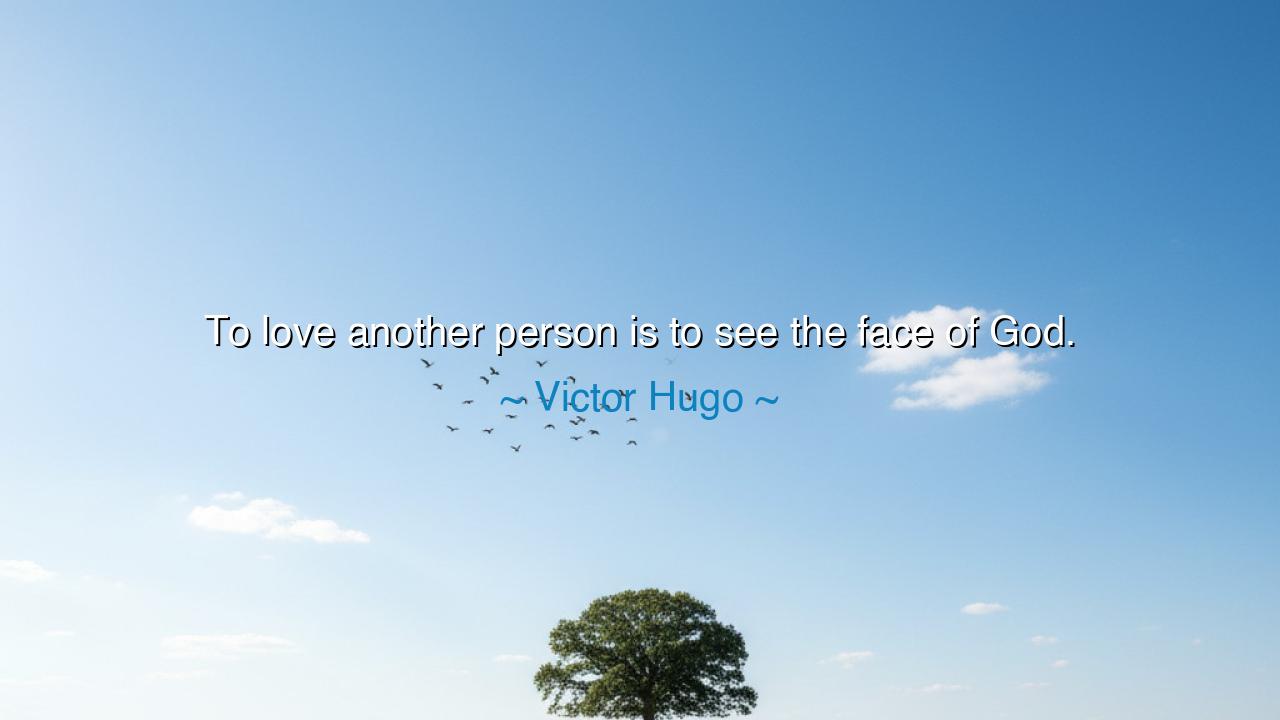
To love another person is to see the face of God.






“To love another person is to see the face of God.” — Victor Hugo
Thus spoke Victor Hugo, the great poet and prophet of the human heart, whose words shine like a beacon through the ages. In this single, luminous sentence, he gives voice to one of the deepest truths of existence: that love is not merely an emotion, but a revelation. To love another person — truly, selflessly, and without measure — is to touch the divine. For in that sacred act of giving, the veil between the human and the eternal grows thin, and through it, we glimpse the face of God — the presence of something pure, infinite, and holy.
This line comes from Hugo’s masterpiece, Les Misérables, a tale of redemption, suffering, and grace. It appears at the story’s end, when the dying Jean Valjean, who has spent his life seeking forgiveness and serving others, looks upon those he loves and finds peace. Through love — not through dogma, not through judgment, not through wealth or power — he has come to understand God. It is not a theological statement, but a spiritual truth: that God is not distant, but found in the light of compassion, in the tenderness of the human heart. Hugo, who lived in a century torn by revolution and faith, declared that to love is the holiest act of all.
The ancients, too, would have understood this. The Greeks called agape the highest form of love — the divine, selfless love that seeks nothing in return. The Scriptures speak of God as love itself: “Whoever loves has been born of God and knows God.” Hugo’s words echo these timeless truths, yet he speaks with the fire of human experience. He does not place God in the heavens, unreachable and abstract; he places God in the face of another — in the suffering, the fragile, the mortal. To see the face of God is not to look upward, but inward and outward, into the heart of one’s fellow being.
Consider the life of Mother Teresa of Calcutta, who lived among the poor and dying. When asked how she could bear to touch the untouchable, she answered, “Each one of them is Jesus in disguise.” She saw the divine in every person — not in their perfection, but in their pain. Through love, she saw God. In the same way, Hugo reminds us that divinity is not hidden in temples or scriptures alone, but in every act of mercy, every glance of understanding, every moment we choose compassion over judgment. Love is the lens through which the human becomes holy.
Yet this love is not sentimental or weak. It demands courage — the courage to forgive, to serve, to sacrifice. To love another is to see, not only their beauty, but their wounds; to embrace not only their light, but their darkness. It is to understand that in lifting another, we rise ourselves. When Hugo speaks of seeing the face of God, he means this recognition — that the divine spark burns within every soul. When we honor it in others, we awaken it in ourselves. And in that awakening, we come closest to heaven on earth.
But how easily we forget this truth! The world teaches us to measure, to compete, to close our hearts. We pass by others as shadows, not as reflections of the divine. We love only those who love us back, and even then, we love with fear, with pride, with conditions. Yet love that reveals God asks for none of these things. It asks only that we see — that we see the sacred in the other’s eyes, the same light that shines in our own. When we learn to love in this way, the boundaries between souls begin to dissolve, and what remains is unity, peace, and purpose.
So, O seeker of wisdom, take this as your teaching: Love not to possess, but to perceive. When you love another, let your heart be open enough to see the divine in them — their struggles, their hopes, their humanity. Let love make you humble, for in loving rightly, you become a mirror for the divine. Serve others as though you serve the Eternal Himself, for indeed, you do.
And remember, as Victor Hugo taught, to love another person is to see the face of God. It is the ultimate act of worship, the highest form of prayer. For when you love, you become both the lover and the divine beloved — a bridge between heaven and earth. Through love, the infinite gazes upon itself through human eyes, and in that gaze, the mystery of existence is answered.






AAdministratorAdministrator
Welcome, honored guests. Please leave a comment, we will respond soon